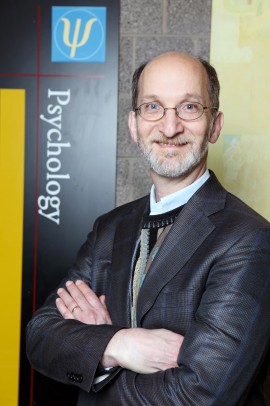Spreading the word on social, emotional learning

“If you know yourself and manage yourself and make good decisions about others, you’re in good shape,” says Roger Weissberg, the NoVo endowed chair in social-emotional learning. Photo: Jenny Fontaine/UIC Public Affairs (click image for larger size)
“Can Emotional Intelligence Be Taught?” asks the cover of a recent New York Times Magazine.
Indeed it can, concludes the accompanying article.
That’s not news to Roger Weissberg, who’s been promoting social and emotional learning for more than 20 years.
Social and emotional learning — SEL for short — “involves teaching kids core competencies — recognizing feelings, self-management, empathy, relationship skills and responsible decision-making,” he said.
In other words, “if you know yourself and manage yourself and make good decisions about others, you’re in good shape,” said Weissberg, the NoVo endowed chair in social-emotional learning and distinguished professor of psychology.
The focus of his work is based on the belief that these competencies can be taught.
“CASEL [the Collaborative for Academic, Social and Emotional Learning] wants this to be done, preschool through high school, in every school in the U.S.,” Weissberg said.
He is president and CEO of Chicago-based CASEL, founded in 1994 by Daniel Goleman, the author of Emotional Intelligence.
“What kids learn from their families, teachers and friends, all work together to promote these capacities,” he said.
Benefits of SEL include improved relationships, reduced conduct problems and emotional distress, and better decisions about risky behaviors like drug use, Weissberg said.
Grades improve, too.
A study of 213 SEL programs in 2011, covering urban, suburban and rural populations, found that “kids felt better about themselves, were more connected and involved in school, reduced bullying and aggressiveness and had better social relationships,” Weissberg said.
“And there was an 11 percentile improvement in achievement test performances.”
The long-term effect also is significant, he said.
“Kids who are socially and emotionally competent go on to be more successful in college and their careers, and are involved in community life in more constructive ways,” Weissberg said.
“Prevention” is a word one often encounters in reading about SEL.
“There are two components,” the educator said. “One is to keep bad things from occurring — drug use, teen pregnancy, violence.
“Then there are the competencies you’re trying to promote; some call it positive youth development. The best way to prevent the bad is to promote the good.”
Weissberg is co-chair of the American Psychological Association task force “Prevention: Promoting Strength, Resilience and Health in Young People.”
Success comes when “kids grow up in a supportive family, if they have an adult who cares about them and thinks they are wonderful, if they go to a good school and feel connected to it,” he said.
In the words of the song, it’s important to “accentuate the positive.”
“A colleague told me a story about a kid applying for a job who told the interviewer, ‘I don’t do drugs, I’ve never been arrested and I didn’t drop out of school,’” Weissberg said.
“The employer said, ‘I know what you didn’t do. Tell me what you did do.’”
CASEL has completed a major review of research-based preschool and elementary school SEL programs. Now it is doing a survey to identify the most effective middle and high school programs.
“We’re trying to identify the best programs out there so that schools across the nation can implement the ones with the best track records of positively affecting kids’ behavior,” Weissberg said.
Born in Newark, he was raised in South Orange, N.J. He did his undergraduate studies at Brandeis University and earned a doctorate from the University of Rochester.
He taught at Yale University for 10 years before joining UIC in 1992.
Weissberg was chosen in 2008 by the George Lucas Educational Foundation for its “Daring Dozen,” honoring those who are reshaping the future of education.
He received the American Psychological Association’s 2000 Distinguished Contribution Award for Applications of Psychology to Education and Training, the 2004 Society for Community Research and Action Distinguished Contribution to Theory and Research Award, and the 2010 Nan Tobler Award for the Best Review of Prevention Research from the Society for Prevention Research.
Weissberg lives in Wilmette with his wife of 32 years, Stephanie Wright, a clinical psychologist.
Their daughter, Elizabeth, 26, is spending two years in Dali, China, on a Yale-China Fellowship and teaching at the Chinese University at Hong Kong. Studying Mandarin and writing, she hopes to be a novelist.
Their son, Ted, is a criminal justice major at Roosevelt University and a spoken-word poet who hosts events for Redefining Our World Through the Arts.
Weissberg is involved in the Collaborating Districts Initiative, promoting SEL in Anchorage, Austin, Chicago, Cleveland, Nashville, Oakland, Sacramento and Washoe County, Nev.
“It’s a multiyear initiative that’s keeping us busy,” he said.
